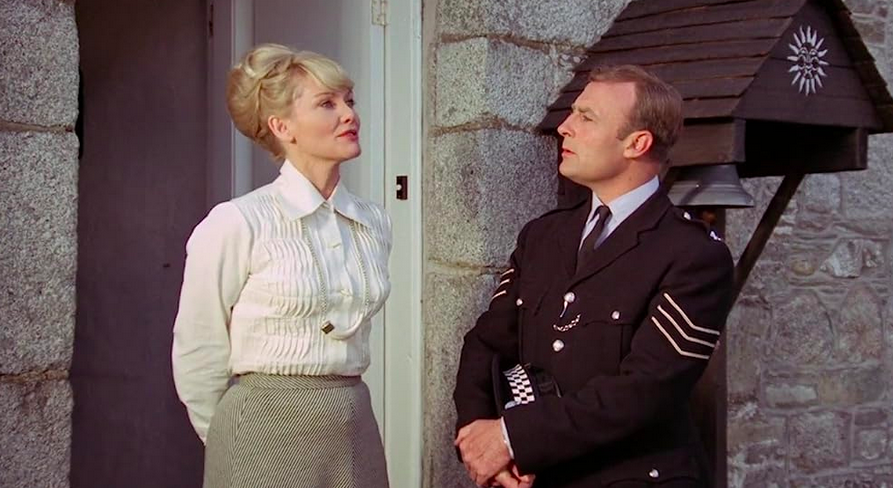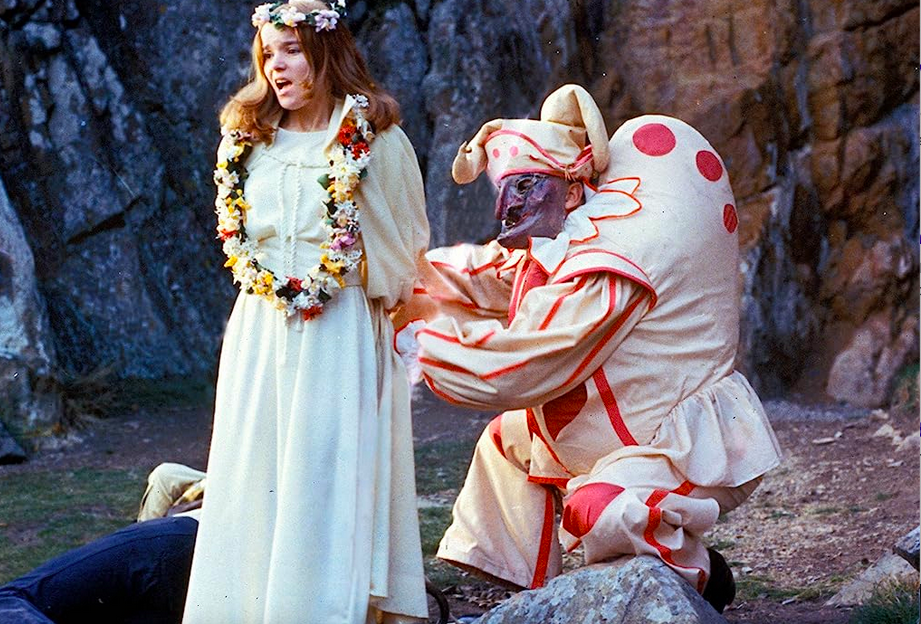The Wicker Man (dir. Robin Hardy, 1973) — Review
Happy 50th birthday to The Wicker Man, the film that has it all: yodelling hipsters, flower crowns, a tweedy eco-fascist who’s still charismatic and chiselled enough to command the viewer’s attention. While the likes of Elon Musk resort to offers of a cage fight to rally their (digital) serfs, back in the day blokes like Christopher Lee’s Lord Summerisle could simply threaten them with crop failure. We were a country, once!
Summerisle, the island upon which the action takes place, is familiar territory indeed: virtually inaccessible from the mainland and populated entirely by sinister, inhospitable yokels who obviously know more than they’re prepared to admit. But the sufficiently diabolical mystery carries such clichés along-perhaps due to the stature as of the clichés, derived from ancient Anglo-Saxon myth and not least due to the heroic efforts of set dressers working on a shoestring budget. Infamously, filming took place in the chill of the Hebridean winter, rather than the lusty May Day of the script, and underpaid crew spent hours gluing paper foliage to the bare branches. Their efforts paid off, particularly in the sinister Disneyland of the town. Historically accurate, perhaps not, but the loving eye of the camera picks out shrivelled organs in chemist’s jars and Edwardian gobstoppers in the sweetshop with equal delight. The baby-shaped chocolate slabs are not just a brash foreshadowing of the plot, but a neat marriage of several creepy tropes: baby dolls, knives, and menopausal women.
The film follows Officer Plod-type Scotsman Sergeant Neil Howie (Edward Woodward), who receives an anonymous letter about a missing girl, Rowan Morrison, on the island. With a hubris that only makes sense when one remembers the lack of police funding out in the sticks, Howie boards a seaplane to investigate solo, after an opening sequence in which he belts out ‘The Lord’s My Shepherd’ with enviable tuning. Alas, the devout Christian finds himself unsettled by the villager’s vague answers, and avowedly phallocentric May Day festivities. Things unravel in predictable yet satisfying fashion, accentuated by comic beats of Howie’s prudishness in the face of surreal danger.
The nicest surprise, however, is that every scene which at first seems too melodramatic, too archaically nutty, rebounds beautifully in the overall scheme of Hardy’s film. For obvious reasons the landlord’s daughter must attempt to seduce the hero on the night he arrives; her plot to drug him must be divulged in a stage whisper outside his door; and he must decide to solve the mystery by donning a disguise and infiltrating the enemies’ ranks. It is a cleverly dovetailed script of the highest order. As far as the treatment goes, one could admit to reservations about the presence of so many foreigners in the Highlands (Britt Ekland, Ingrid Pitt and even Christopher Lee), although under the circumstances it is remarkable what post-synchronisation and a red wig respectively can achieve.
The countryside is not, the film suggests, what it was. Young people populate Summerisle’s pub in a way that must have been mirrored in the flocking of young people to Pembrokeshire in the 1960s and 70s to try to live off the land (in practice, to grow marijuana cluelessly in sun-deprived locations) and set up folk festivals. In contrast to the animosity this raised between local and newcomer in Wales, no generational rifts divide the island of Summerisle. Unity rings out between young and old, brought together by worship of a sensual ancient order and the music that casts a variety of spells over them.
The soundtrack of the film cleverly mirrors this insidious harmony across the island. The soundtrack of The Wicker Man feels almost entirely diegetic, with the characters interacting freely with it, in the style of a lecherous musical. More serious intrusions of the ‘production numbers’, with the exception of the spinechilling finale- the islanders ecstatically chanting “Sumer Is lcumin In” as their victim roasts to death- have a whiff of the jukebox musical.
Its bawdy, memorable grab bag of weird folk and original compositions came courtesy of American playwright and musician Paul Giovanni, who recruited several recent RCM grads and and a British folk-rock band called Hocket to his cause. The oddball crew formed a band called Magnet, existing solely for the recording and shooting of the film. It features traditional songs and tunes including the Middle English poem ‘Sumer Is Icumen In’, and Scottish Child Ballad ‘Fause Foodrage’. Giovanni’s twee, ingenious arrangement slips English folk tunes and instrumentation in through the soundtrack’s incidental music, with honking recorders and pipes that probably owe as much to Jethro Tull and Led Zeppelin as they do the ‘music of the hills’. However, Giovanni’s lyrics, and his excellent ear for the creepy-horny turns of the traditional ballad, ensure effective bacchanalia. Original composition ‘Willow’s Song’ serves as soundtrack to a Glasgow stripper butt-doubling for Britt Ekland as she tries to seduce the dour copper, bawdy and bizarre in equal measure. The soundtrack also drives home the cyclical nature of the islander’s year, with hoots of ‘Sumer Is A-cumen In’ as Howie’s fate is sealed, in contrast to earlier, when plaintive, ominous horns and drumbeats mark the villagers’ procession.





